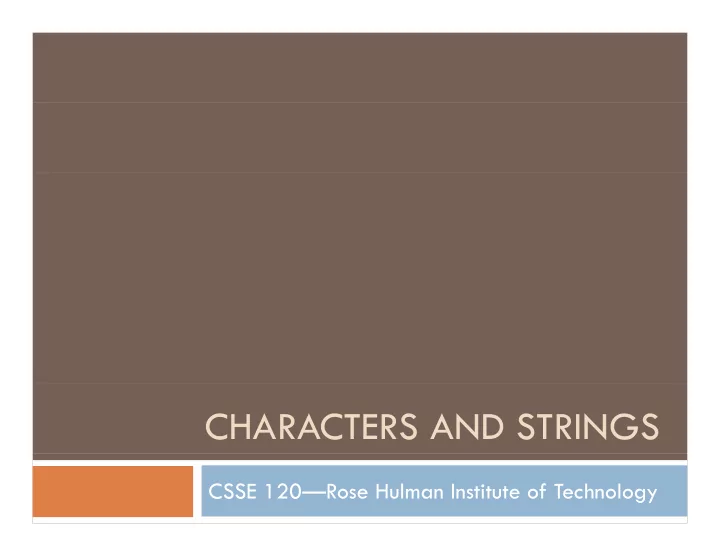

CHARACTERS AND STRINGS CSSE 120—Rose Hulman Institute of Technology
Characters and Strings g
Characters in Python y � Just a special case of string � Just a special case of string >>> myChar = 'C' >>> print myChar p y C >>> print ord(myChar) # converts character to int 67 >>> print chr(67) # converts int to character C
Characters in C � C's char type is really a kind of number! � C s char type is really a kind of number! � A char takes 1 byte of storage space � Example: � Example: char myChar; myChar = 'C'; printf("%c\n", myChar); /* %c is format spec. for char */ printf("%d\n", myChar); /* can print char as a decimal */ printf("%c\n", 67); printf( %c\n , 67); /* can print int as char */ / can print int as char / myChar++; printf("%c\n", myChar); /* What prose do you suppose? */ Q1
Ten Ways to Say 'A' y y char c = 'A'; char c = A ; int i = 'A'; printf("A"); printf("%c", 'A'); i tf("% " 'A') printf("%c", 'B'-1); printf("%c", c); printf("%c", i); putchar('A'); /* can "push" single characters to output */ putchar('C' - 2); putchar( C 2); putchar(toupper('a')); /* Need to #include <ctype.h> */ putchar(c); putchar(i); t h (i) Q2
Math with Characters � We can do math with character types: � We can do math with character types: � 'C' + 1 == 'D' � char b = 'b'; � char b b ; b--; putchar(b); /* outputs a */ � Combine these ideas to write a for loop that prints the characters from 'a' to 'z' on a single line � Try this in Eclipse, work with a neighbor � Write your answer on your quiz Q3
Getting Characters g � To read a single character from the console use: � To read a single character from the console use: � getchar() � Caveat: getchar() returns an int , either a char value or � Caveat: getchar() returns an int , either a char value or EOF (end of file) Note: most operating systems only void getSomeChars() { pass characters to your program int inChar; after the user presses the enter key after the ser presses the enter ke int count = 0; printf("\n\nType some text, then press 'Enter': "); fflush(stdout); inChar = getchar(); inChar = getchar(); while (inChar != '\n' && inChar != EOF) { count++; inChar = getchar(); } printf("\nYou entered %d characters.", count); } Q4
Character Functions: ctype.h yp � Conversion Functions: � Conversion Functions: � Test functions: � Test functions: � int tolower(int c); � isdigit(c) � int toupper(int c); ouppe ( c); � isalpha(c) sa p a(c) � islower(c) � isupper(c) pp ( ) � isspace(c) S See the C Library Reference link on ANGEL under h C Lib R f li k ANGEL d Course Resources for more functions.
Just Stringing You Along g g g � "Strings" in C are just g j � arrays of characters, � with a '\0' at the end � Examples: � char fname[] = "Lou"; h f [] "L " char lname[10]; h l [10] …note difference in box-and-pointer diagrams p g How would we assign “Gehrig” to lname? � char lname[] = “Gehrig” 1. character-by-character assignment 2. strcpy(coming soon) 3. Q5-Q7
String variables vs. constants g � String Variable g � String Constant g � char s[] = “foo”; � char *t = “foo”; � Strings declared in this way g y cannot be mutated! t: s: f o o \0 f o o \0
String Functions: string.h g g Function Purpose char *strcpy(char *dest, char* src) copy string src to string dest, including '\0'; return dest char *strcat(char *dest, char* src) concatenate string src to end of dest; return dest int strcmp(char *str1, char *str2) compare string str1 to string str2, return a negative number if str1<str2, zero if str1==str2, or positive otherwise char *strstr(char *str1, char *str2) return a pointer to first occurrence of str2 in str1, or NULL if not present size t strlen(char *str) size_t strlen(char *str) return length of str (size t is a typedef for int on most return length of str (size_t is a typedef for int on most systems) Note: we usually ignore the Note: we usually ignore the Descriptions from K&R, p. 249. Descriptions from K&R, p. 249. return stypes on strcpy and See the C Library Reference link on strcat, since they mutate dest. ANGEL for more.
String Concatenation Using strcat() g g () � Consider: � Consider: char s1[] = "Go, Red! Go, White! "; char s2[] = "Go Rose, Fight!"; /* ??? */ /* ??? */ printf("%s\n", s3); � What goes in the space? We want: � What goes in the space? We want: � the output to be Go, Red! Go, White! Go Rose, Fight! � and no additional string literals Q8
Summary: Strings in C y g � Strings are arrays of characters: � Strings are arrays of characters: � char fname[] = "Lou"; Key or or Points! � char lname[10]; strcpy(lname, “Gehrig”); � "Null terminated", that is, a '\0' at the end � Don't forget to reserve enough space to hold the g g p string � (next week we'll see how to ask for just enough space dynamically) Q9
When C Gives You Lemons… � Problem: � Problem: � Python includes high level functions for strings � C (and some other languages) do not � C (and some other languages) do not � What if you need to use C, but also need strings? � Solution: Make your own string functions! � Solution: Make your own string functions! � Homework: � Check out CharactersAndStrings from your SVN repo � Check out CharactersAndStrings from your SVN repo � See homework description linked from ANGEL � Let’s start it together. � Let s start it together.
Recommend
More recommend